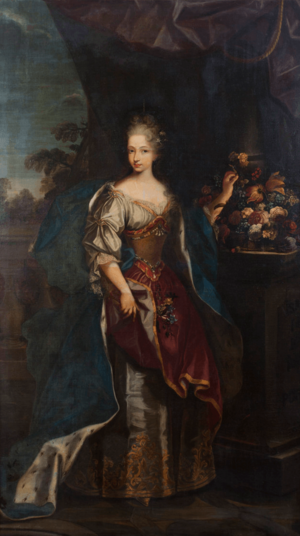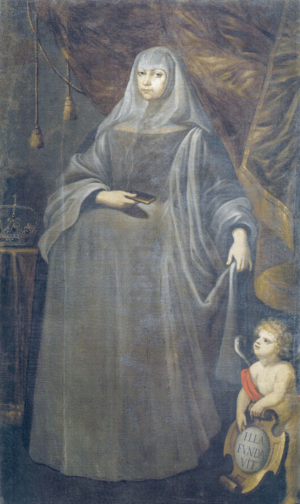Maria Francisca of Savoy facts for kids
Quick facts for kids Maria Francisca of Savoy |
|||||
|---|---|---|---|---|---|
 |
|||||
| Queen consort of Portugal | |||||
| Tenure | 12 September 1683 – 27 December 1683 | ||||
| Tenure | 2 August 1666 – 24 March 1668 | ||||
| Born | 21 June 1646 Hôtel de Nemours, Paris, France |
||||
| Died | 27 December 1683 (aged 37) Palhavã, Lisbon, Portugal |
||||
| Burial | Pantheon of the Braganzas | ||||
| Spouse |
|
||||
| Issue | Isabel Luísa, Princess of Beira | ||||
|
|||||
| House | Savoy | ||||
| Father | Charles Amadeus, Duke of Nemours | ||||
| Mother | Élisabeth de Bourbon | ||||
| Religion | Roman Catholicism | ||||
Dona Maria Francisca Isabel of Savoy (French: Marie Françoise Élisabeth; 21 June 1646 – 27 December 1683) was a Queen of Portugal. She was queen during her marriage to King Dom Afonso VI from 1666 to 1668. Later, she became queen again as the wife of Afonso's brother, King Dom Peter II, from September 1683 until her death in December of that year.
Maria Francisca married Afonso VI when she was 20 years old. Their marriage was later canceled because it was never completed. In 1668, she married Afonso's brother, Infante Dom Peter. Peter became the prince regent (a ruler who governs for a king who is too young or unable to rule) that same year. She became queen for the second time when Afonso died and Peter became king. However, she passed away just three months later.
Contents
Early Life and Family
Maria Francisca was born in Paris, France. She was the younger daughter of Charles Amadeus of Savoy, Duke of Nemours. Her mother was Élisabeth de Bourbon-Vendôme. Her mother was also related to Henry IV of France. Maria Francisca's only surviving sister was Marie Jeanne of Savoy. Before she was married, she was known as Mademoiselle d'Aumale.
Becoming Queen with Afonso VI
From 1581 to 1640, Portugal and Spain were united under Philip II. However, many people in Portugal wanted their independence. This led to the Portuguese Restoration War, which lasted from 1640 to 1668. By the end of 1665, Spain's attempts to take back Portugal had failed. Spain was also facing serious money problems.
Portugal's chief minister, Castelo Melhor, wanted to make his own position stronger. Afonso VI became king in 1656 after his father died. However, Afonso had physical challenges and was not always stable. His mother, Luisa de Guzmán, controlled the government. In 1662, Afonso, guided by Castelo Melhor, sent his mother to a convent.
The Portuguese government was divided into two groups. One group supported France, led by Castelo Melhor. The other group supported England, led by Afonso's younger brother, Pedro. In 1662, Charles II of England married Afonso's sister, Catherine. Castelo Melhor and Louis XIV thought that a marriage between Maria Francisca and Afonso would help balance this.
Louis XIV convinced Charles II to agree to the marriage. Maria Francisca arrived in Portugal on August 2, 1666, and the wedding happened on the same day. She became known as Maria Francisca Isabel de Sabóia.
Challenges in the First Marriage
The marriage to Afonso was not what Maria Francisca expected. Afonso left the wedding celebrations early. He also did not seem interested in completing the marriage. Maria Francisca was a smart and determined person. She wanted to help France and also have a role in ruling. She soon realized that Afonso was controlled by Castelo Melhor, who did not want to share power. This led her to work with her brother-in-law, Pedro.
The marriage and a treaty with France in March 1667 were supposed to help Castelo Melhor. However, they actually weakened his power. Portugal was very low on money, but the treaty required them to help France against Spain. Maria Francisca also convinced Louis XIV that Pedro would be better for French interests. In September, Castelo Melhor was forced to leave the country. In November, Pedro took over from his brother. Afonso was sent to Terceira Island in the Azores.
Maria Francisca went to a convent and asked for her marriage to be canceled. She said it was because the marriage was never completed. Her relative, Cardinal Vendôme, approved the annulment. She then married Pedro in September 1668.
Becoming Queen Again with Peter II
A few months after her first marriage was canceled, Maria Francisca married Infante Peter. Peter was now the prince regent of Portugal, meaning he ruled in place of the king. In 1669, she gave birth to a daughter, Isabel Luísa Josefa of Portugal. Their daughter was known as the Princess of Beira.
Peter needed more children to continue the royal family line. However, Maria Francisca was unable to have more children after Isabel Luísa.
When Afonso died in 1683, Peter became King Peter II of Portugal. Maria Francisca became queen again. However, she passed away in December of the same year, only three months after becoming queen for the second time. Her only child, Infanta Isabel Luísa, died at age 21 and never married. Peter later married Maria Sofia of the Palatinate. They had a son who became the future John V of Portugal, ensuring the royal family continued.
Maria Francisca was first buried at the Convent of the Francesinhas. In 1912, her remains were moved to the Pantheon of the House of Braganza at the Monastery of São Vicente de Fora.
|
Maria Francisca of Savoy
Born: 21 June 1646 Died: 27 December 1683 |
||
| Portuguese royalty | ||
|---|---|---|
| Vacant
Title last held by
Luisa de Guzmán |
Queen consort of Portugal and the Algarves 1666–1668 1683 |
Vacant
Title next held by
Maria Sophia of Neuburg |
See also
 In Spanish: María Francisca de Saboya-Nemours para niños
In Spanish: María Francisca de Saboya-Nemours para niños
 | Valerie Thomas |
 | Frederick McKinley Jones |
 | George Edward Alcorn Jr. |
 | Thomas Mensah |


